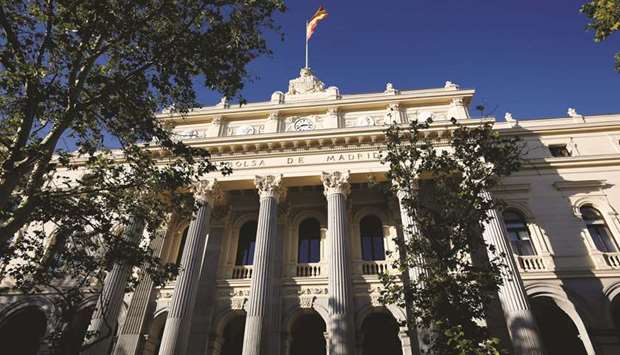A battle for the Madrid stock exchange erupted as Switzerland’s SIX Group AG announced a €2.8bn ($3.1bn) takeover bid, minutes after Euronext NV confirmed its own interest.
SIX, which is owned by a group of Swiss banks, said yesterday that its proposal for Bolsas y Mercados Espanoles SA would create the third-largest European operator of financial market infrastructure. Its all-cash offer – a third higher than BME’s closing price last week – won a positive nod from the target’s management.
That puts the ball in Euronext’s court. The owner of the Paris and Amsterdam exchanges said it was in talks with the Spanish company’s board as Chief Executive Officer Stephane Boujnah hunts for deals to build scale and enter new markets. He most recently won a fight with Nasdaq Inc for the Oslo stock exchange.
“The premium SIX has offered is quite high,” said Matthias de Wit, an analyst at Kempen & Co “I hope Euronext will stay disciplined and not outbid SIX to acquire BME, as I consider the valuation quite punchy.”
BME shares rose as much as 37% in Madrid, surpassing SIX’s offer price of €34 per share. Euronext climbed 1.5% in Paris, bringing its surge this year to 45%.
BME described SIX’s offer as “amicable” and reflective of the company’s value, and agreed to a break fee of 0.5% of the ultimate transaction price, equivalent to 14mn euros with the current bid. However, it previously confirmed what it called “preliminary talks” with Euronext and said that no decision had been taken on that approach.
For Switzerland’s dominant exchange, BME’s appeal may be rooted in the Alpine nation’s battle with the European Union. In August, people familiar with the matter said the Spanish company was a potential target in case the EU’s ban on the trading of Swiss equities inside the bloc endured or escalated. In yesterday’s statement, SIX chairman Romeo Lacher said the deal aimed to provide “seamless access to capital markets,” and BME said SIX’s plan was to use the Spanish firm as “a platform to grow and increase the presence of the combined business in the EU.”
However, SIX CEO Jos Dijsselhof said on a conference call that the bid was unrelated to the EU discussion and is unlikely to affect that dispute, and that his firm didn’t consider buying a different exchange. He said that there’s a drive for consolidation in the industry, and a trend for exchanges to diversify their business mix.
“Trading in Swiss shares will stay in Switzerland now and forever,” Dijsselhof said, when asked whether the BME exchange would be used to allow EU investors more access to Swiss shares via that platform.
Still, some observers were sceptical that the spat with the EU wasn’t a factor for SIX.
The surprise offer is a dramatic reversal of course for the Swiss company, which just three months ago said it saw “no need to buy a stock exchange in the EU.”
“For the Swiss, the showdown about equivalence means having a foothold within the EU is important, and I would expect that to be their number one trigger,” said Niki Beattie, the founder of Market Structure Partners, a consultancy in London.
“For Euronext, it’s part of their mission to grow the exchange across Europe. I expect they have simply gone on the offensive as they don’t want to see BME taken off the table.” Dealmaking in the exchange sector has gathered pace. Besides Euronext’s months-long battle for the Oslo exchange earlier this year, Hong Kong Exchanges & Clearing Ltd abandoned its £29.6bn ($38bn) bid for London Stock Exchange Group Plc after failing to win over investors.
BME chief financial officer Marta Bartolome has said the Spanish bourse was open to co-operating with other exchanges. Analysts at Citigroup Inc had called her company their least preferred exchange stock, given its limited prospects for growth. De Wit, the analyst at Kempen, said BME presents SIX with limited synergy opportunities and exposure to volatile equity trading.
People familiar with the matter told Bloomberg News earlier this month that Euronext was considering both the Spanish exchange and Italy’s Borsa Italiana as targets. That prompted Boujnah to say at the time that there was “no substance whatsoever” and that no dialogue had taken place with the Spanish or Italian bourses.

An external view of the Madrid bourse in Spain. A battle for the Madrid stock exchange erupted as Switzerland’s SIX Group announced a $3.1bn takeover bid, minutes after Euronext confirmed its own interest.


